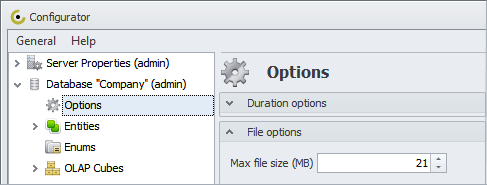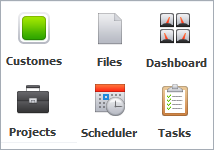Key Reasons for Searching Microsoft Access Alternative
Microsoft Access is a powerful database management system that lets businesses set up and configure their small databases with ease. It has nice UI features to quickly access and modify necessary data. Users are enabled to manipulate datasets, create forms, make templates, generate customized reports, etc. However, this software has some drawbacks and limitations that make many businesses look for Microsoft Access solutions.
Multiuser Access Limitation
If you have ever tried Microsoft Access, then you probably know that this program supports multiuser access. This capability is very helpful for businesses. For example, employees of Sales department can simultaneously access one and the same database to operate the same datasets. These users can share and communicate information with their colleagues and other departments and teams in real time.
Simultaneous User Access and Database Performance
Microsoft announces that Access supports up to 255 connections to one database at once. This number is quite acceptable for small business companies. But the corporation tells little about performance. How well will the database perform if all 255 concurrent users are connected to it?
The problem is that the more concurrent users connect to one database the greater bandwidth usage becomes and the lower database performance is. For a small company that has up to 20-30 workers this multiuser limitation in MS Access may not be critical. However, for larger companies it becomes crucial. If this limitation is important for your business, then apparently you need to start looking for a Microsoft Access alternative solution.
Database Size Limitation
Just like other alternative database management programs, MS Access lets keep all information in a centralized database that is easy to access over LAN or Internet connection. Everything from notes and tasks to files and spreadsheets can be securely stored and organized in Microsoft Access template database. Users are enabled to save their records in the database and then retrieve necessary information when required.
Less Than 2 GB in Database Size
However, the more information you save and keep in your database the larger the database becomes. And Microsoft Access is highly sensitive to this statement as its file size cannot exceed 2 GB. At first sight, this limitation is not too critical, especially if you are not going to save files in MS Access database. But in fact many companies prefer using Microsoft Access alternative software because of this limitation. The point is that every organization has to add and update multiple business data (transactions, orders, projects, clients, personnel, and much more) on a daily basis, so the database will inevitably grow in size.
Access Templates at Greater Headache and Cost
For Microsoft Access you can find a number of templates that let you begin to manage your database with no need for creating sample forms and tables. Access templates are designed for sales, project management, scheduling, CRM, and other business matters. You can change and configure template databases according to your specific business needs.
Meanwhile, there is a popular belief that the template capability in MS Access is oriented towards developers and VBA programmers rather than end-users who know nothing about VBA, SQL, and other special knowledge areas. This fact causes greater headache for those users, because in case they want to customize a ready-to-use sample database to their needs, they have to go to greater expense to pay for database programming services. That's why Microsoft Access alternatives are of high importance to end-users who want to get a simple and easy-to-use program for managing and customizing databases.
Excel Users Would Never Go for Access
Microsoft Excel is one of the most popular solutions to make data calculations and manipulations in spreadsheets. People love this package as it ensures simplicity and transparency in managing spreadsheet data. In MS Access calculations are done through queries and ad-hoc tables, which are not simple to set up and manipulate by end-users. Besides, Excel does a much better job at building diagrams and graphs than Access.
In this regard, even if Excel users decided to switch to a more powerful data management program they would never go for Access. They would rather look for an easy-to-use yet featured solution, for CentriQS software. CentriQS is full-featured data management system which is simple in use and does not require special knowledge in database customization and management.
CentriQS as Microsoft Access Alternative
CentriQS offers business management software solutions that allow small businesses to create and configure their databases. The program supports multiuser connection to one and the same database, so all of your employees can access your database simultaneously to share and communicate business data in real time. It supports connection over LAN and Internet.

Set Max File Size
CentriQS is a great alternative to Microsoft Access. It lets you keep files and documents in your database. To make sure that the database is not going to grow in size because of too larger files saved in it, you can set max file size in CentriQS Configurator. For example, you can allow users to upload files of 10 Mb in size. Moreover, your database's performance in CentriQS won't get slower even if you keep many documents and other business information in it.
More CentriQS Features for Better Data Management
Data management involves an administrative process to create, collect, summarize and retrieve data without loss of integrity and without interference. This process aims to present business information in an easy to use format and when requested by user. CentriQS lets organize and manage the process. This Microsoft Access alternative enables you to manage information use allocate database access within your business.

Here are more features that make CentriQS a powerful tool for better data management:
- CentriQS installation comes with a full featured and easy-to-use database designer that lets create and configure databases for business needs.
- There is a data verification system that prevents database errors and highlights wrong entities when you customize and configure your database.
- Entities and their related items (properties, workflows, tables) can be linked to each other, so this capability enables you to set data relationships.
- Rich text editor can be embedded into entity properties.
- You can run your database on MS SQL server.
- Certain users can be limited to viewing or changing data
- The program makes it easy to print out views and export data into popular file formats, incl. PDF, XLS, HTM, others.
- CentriQS has a data migration assistant that enables VIP Task Manager users convert their data into CentriQS database format.
Prev.: How to Make a Database for Small Business Company || Next: Using Microsoft Access Template for Creating Database
Next steps
{
Check out CentriQS FEATURES & SCREENSHOTS
Watch 7-minute CentriQS VIDEO OVERVIEW
Learn how to use CentriQS in KNOWLEDGE BASE
DOWNLOAD CentriQS 30-day Free Trial Version
CONTACT US to get help with CentriQS Database Design & Configuration